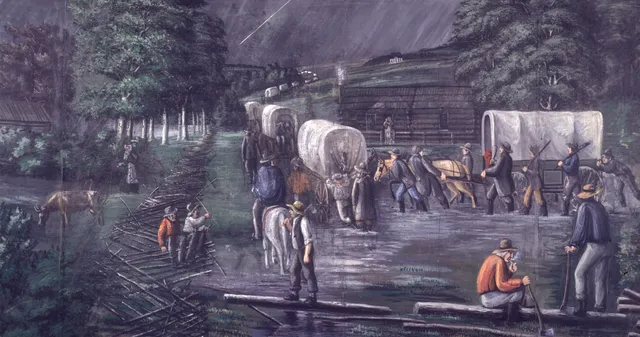
FAIR is a non-profit organization dedicated to providing well-documented answers to criticisms of the doctrine, practice, and history of The Church of Jesus Christ of Latter-day Saints.
FAIR › Scripture Study Resources: Supplement Your Come, Follow Me Study › Study Resources for the Doctrine & Covenants and Church History › Week 38 After Much Tribulation … Cometh the Blessing
DOCTRINE AND COVENANTS 102-105

In D&C 103:36, the Lord reassures the Saints that He will go before them and be their rearward if they are faithful. This promise of divine protection and reward emphasizes that while trials may be prolonged, enduring them well leads to peace and spiritual maturity.
The article “A Chance to Start Over” clarifies that Church discipline is not merely punitive—it’s restorative. It provides an opportunity for individuals to repent and experience the healing power of Jesus Christ. This process shows the Church’s commitment to both justice and mercy.
D&C 102 outlines procedures for disciplinary councils and shows how repentance can lead to a restoration of priesthood blessings. This demonstrates the importance of proper authority and the principle that no one is beyond the reach of God’s grace if they sincerely turn to Him.
As taught in the Beatitudes and emphasized in modern revelation, peacemakers are called the “children of God” (Matthew 5:9). This role invites divine help and guidance. When we seek peace, we align ourselves with God’s will and can help others feel His love and healing.
If you have questions on this week’s reading, please email your questions to us here.
Practical solutions for someone in faith crisis:
Action Step: Seek out one unresolved conflict in your life and take a step toward reconciliation.
Jesus Christ taught, “Blessed are the peacemakers” (Matthew 5:9), and modern prophets reaffirm that peacemaking is central to discipleship. Taking initiative to resolve tension brings spiritual peace and strengthens relationships.
Encouraging Thought:
President Russell M. Nelson said, “Peacemakers are not passive; they are proactive in seeking to resolve conflict” (Peacemakers Needed). Peacemaking invites the Spirit and reflects divine love.
Action Step: Identify one ongoing trial and write down how you can show faith while waiting for God’s help.
D&C 103:12–13 teaches that God allows us to be “tried, even as Abraham.” Understanding that blessings often follow patience and obedience helps us endure trials with greater faith and less fear.
Encouraging Thought:
Doctrine and Covenants 102 and the article A Chance to Start Over emphasize that discipline is meant to restore, not shame. Our love and support can be crucial in helping others feel the Savior’s embrace through us.
Encouraging Thought:
“The Savior always stands ready to welcome us back… and He invites us to do the same for others.” (A Chance to Start Over)
Objective: Help learners understand that spiritual growth often comes through challenging experiences, even when outcomes differ from expectations.
Printed map of Zion’s Camp journey, quote from a Zion’s Camp participant (e.g., Wilford Woodruff), markers or pens
Activity Steps:
Follow-Up Question: How can we recognize spiritual success even when our plans don’t go the way we hoped?
Objective: Teach that Church disciplinary councils are guided by love and aim to restore individuals to full fellowship.
Handout summarizing D&C 102 council structure, printed story excerpt from A Chance to Start Over, whiteboard
Activity Steps:
Introduction (5 min): Ask, “When have you needed a second chance?” Allow one or two responses.
Scripture Discussion (5 min): Walk through the basic structure of a Church council from D&C 102. Emphasize the principles of fairness, prayer, and restoration.
Application (5 min): Read a short account from A Chance to Start Over about someone who returned. Then, brainstorm ways we can support others spiritually during their “start over” process.
Follow-Up Question: How can we better reflect the Savior’s love when someone around us is trying to repent and return?
Objective: Encourage learners to proactively seek peace in their homes, classes, and communities.
Quotes from Peacemakers Needed, role-play cards with real-life conflict scenarios
Activity Steps:
Introduction (5 min): Display the quote from President Nelson: “Peacemakers are not passive; they are proactive.” Ask, “What does a proactive peacemaker look like?”
Scripture Discussion (5 min): Read Matthew 5:9 and D&C 105:38–40. Discuss why contention is the Lord’s concern and how He invites unity.
Application (5 min): In pairs or small groups, read short scenarios (e.g., family argument, class disagreement) and role-play a peacemaking response.
Follow-Up Question: What does it take to be a peacemaker when emotions are high or when you feel wronged?
Doctrine and Covenants 105:38–40 – Counsel to cease contention and seek peace.
“Peacemakers Needed” by President Russell M. Nelson

FAIR is a non-profit organization dedicated to providing well-documented answers to criticisms of the doctrine, practice, and history of The Church of Jesus Christ of Latter-day Saints.
We are a volunteer organization. We invite you to give back.
Donate Now